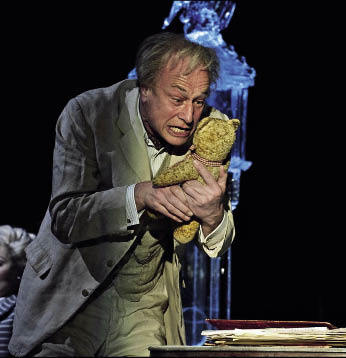Elegy for Young Lovers
Young Vic, in rep until 8 May
Albert Herring
Blackheath Halls
Hans Werner Henze’s Elegy for Young Lovers, with a libretto by Auden and Chester Kallman, is less familiar than one might expect. Never recorded complete, it has rarely been performed in the UK since Glyndebourne staged it in 1963. Yet in the excellent new production at the Young Vic, the concentration awarded by the audience was instantly apparent, and maintained throughout the three hours the piece lasts. ENO has got Fiona Shaw to direct, and one of the results is that the performers behave like human beings rather than opera singers, and even speak their lines — there is a considerable amount of spoken dialogue — naturally. That, combined with the skill with which Auden (I shall use his name only from now on) gets the piece under way, makes for a set of immediately credible characters. The singers drop things, fall downstairs, and recover themselves in a way that leaves you wondering whether or not it was intentional — just as it should be. Given the complexities of the piece, the amount of text, and the placing, in the Young Vic, of the orchestra at a higher level, the sheer smoothness of the proceedings is a source of pleasure.
Not all the roles are ideally cast, but the performers all act with a conviction which makes that matter less than you’d expect. Gregor Mittenhofer, the central character, an egoistic monster of a poet, is fortunately incarnated in Steven Page, one of our finest baritones and actors, here looking like Bertrand Russell, another old goat with high ideals. Though the opera is about him, in that Auden was fascinated and repelled by the artistic personality — Yeats, Wagner, himself — which ruthlessly uses other people in the interests of great creations, it is about many other things too, and it is only after it has been going for most of Act I that one starts to wonder whether even so adept a pair of craftsmen as Auden and Henze can cope with them all. By the time we get to Act III, it seemed clear to me that they couldn’t, and that there are too many holes that have to be filled in by the audience’s imagination, while they already have their eyes and ears full coping with the superabundance of stimuli.
The characters — there are six important ones — are involved in a complex tangle of relationships of a kind that one might expect to find in a novel, and not for the first time I wondered whether Auden gave sufficient thought to the things opera does best, and those it is better for it to leave alone. He was, of course, very attracted by the form because of its possibilities of emotional extravagance and the ease with which it can slip into camp, which he adored. What happens in Elegy is a strange parcelling out of the camp elements, undeniably present, and ones that are much more prosaic, while others are determinedly ‘serious’. Hilda Mack, the woman who has spent 40 years in an Alpine inn because her lover disappeared in a snowstorm, is utterly camp, indulging in endless bouts of coloratura, though they were longer still before Henze revised the work. Jennifer Rhys-Davies, clothed and padded grotesquely, squawked out the part with every sign of relish. Hilda was the reason Mittenhofer began visiting the inn, but he replaces her with the young lovers, one of them his mistress, whose elegy he is eager to write. We see and hear them die on the mountain. In his lecture on his operas, Auden wrote of this scene:
He was absolutely right, and what he says there applies to quite a lot more of the text. Where it doesn’t, it coaxed out of Henze some of his most agreeable and inventive music.
Regular readers may be getting weary of my enthusiasm, always duly reported, for every production I see of Britten’s great comedy Albert Herring. But it suits so wonderfully the schools of music which mount it that it never fails. Trinity College of Music put it on in Blackheath Halls, a cavernous, barrel-vaulted tube where words got lost, but it survived, thanks to the marvellously lyrical and relaxed conducting of Steuart Bedford, who made Sid and Nancy’s scenes intensely erotic. Albert was too much the pretty boy, and Lady Billows yelped; but the spirit and Britten’s prodigious creative flow were triumphant. It was very well worth the trip into an uncharted area of south London.






Comments